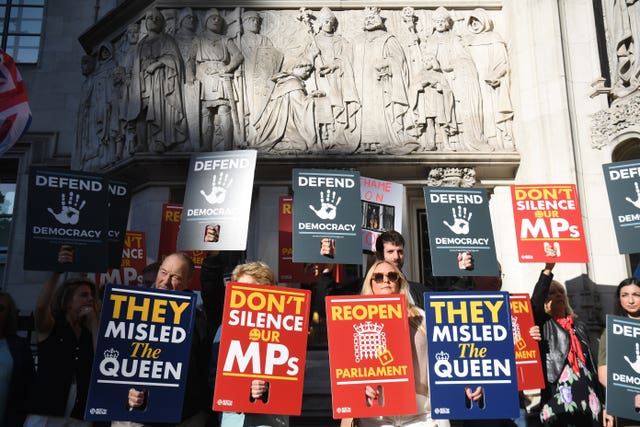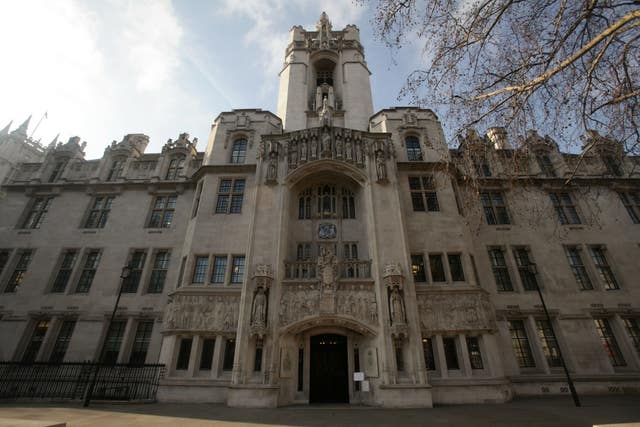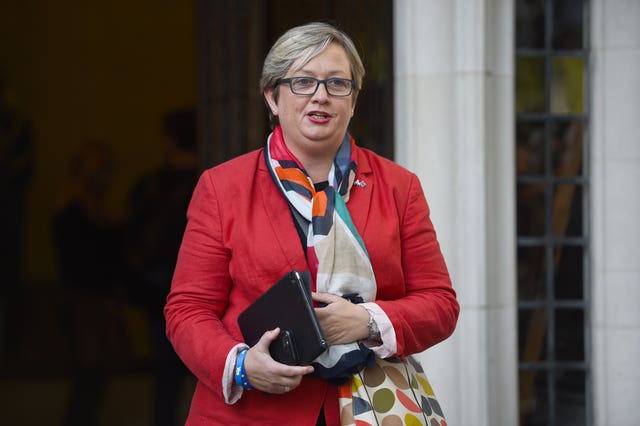Challenges over PM’s decision to suspend Parliament under way at Supreme Court
The UK’s highest court is hearing appeals from two separate challenges in England and Scotland over the prorogation of Parliament.

The UK’s highest court has started to consider legal challenges over Prime Minister Boris Johnson’s advice to the Queen to suspend Parliament.
The Supreme Court in London is hearing appeals from two separate cases brought in England and Scotland against the prorogation of Parliament over three days, starting on Tuesday.
Mr Johnson says the five-week suspension is to allow the Government to set out a new legislative agenda in a Queen’s Speech when MPs return to Parliament on October 14.
But those who brought legal challenges against the Prime Minister’s decision argue the prorogation is designed to prevent parliamentary scrutiny of the UK’s impending exit from the EU.

A crowd of about 40 protesters, holding signs saying “Defend democracy”, “Reopen Parliament” and “They misled the Queen”, gathered outside the court ahead of the hearing.
The Supreme Court, which will sit as a panel of 11 justices for only the second time in its 10-year history, must reconcile contradictory judgments issued by the English and Scottish courts.
The High Court in London dismissed the case brought by businesswoman and campaigner Gina Miller – who previously brought a successful legal challenge against the Government over the triggering of the Article 50 process to start the Brexit countdown – on September 6.
Three of the most senior judges in England and Wales ruled that the length of the prorogation was “purely political” and not a matter for the courts.
But the Inner House of the Court of Session in Edinburgh ruled on September 11 that Mr Johnson’s decision was unlawful because “it was motivated by the improper purpose of stymying Parliament”.
The Supreme Court justices are being asked to determine in both appeals whether the Prime Minister’s advice to the Queen is “justiciable” – capable of challenge in the courts – and, if so, whether it was lawful.
In the Scottish case, they are also being asked to consider whether the appeal is “academic”, given parliamentary sittings before the UK’s proposed exit from the EU on October 31.
Mrs Miller’s challenge was supported by former prime minister Sir John Major, shadow attorney general Baroness Chakrabarti and the Scottish and Welsh governments, who are all interveners in the Supreme Court case.
A cross-party group of around 75 MPs and peers, led by SNP MP Joanna Cherry QC, was responsible for the Scottish challenge and the appeal against the Court of Session’s decision is being brought by the Advocate General for Scotland, on behalf of the Westminster Government.
Victims’ campaigner Raymond McCord – who brought separate proceedings in Belfast, arguing that a no-deal Brexit would damage the Northern Ireland peace process – has also been given permission to intervene in the Supreme Court case.

Mrs Miller was greeted by supporters cheering and shouting “Bravo Gina Miller” as she arrived at the court for the hearing.
In an earlier statement, Mrs Miller said: “As with my first case, my Supreme Court case is about pushing back against what is clearly a dramatic overreach of executive power.
“This is an issue that cuts across the political divides – and the arguments about the EU – and it has united remainers and leavers and people of all political complexions and none in opposition to it.
“The precedent Mr Johnson will set – if this is allowed to stand – is terrifying: any prime minister trying to push through a policy that is unpopular in the House and in the country at large would from now on simply be able to resort to prorogation.
“No-one could ever have envisaged it being used in this way: this is a classic power-grab.”

In an interview with BBC Radio Scotland before the hearing, Ms Cherry said she is “cautiously optimistic” that the ruling by the Scottish judges will stand.
She added: “I think that Scotland’s supreme court reached the right decision here for the right reasons and I’m cautiously optimistic that at least a majority of the UK Supreme Court justices will follow.”
Around 100 people attempting to get into court to watch the proceedings waited outside from about 8am and veteran broadcaster David Dimbleby came to speak to those queuing.
Speaking to PA, Mr Dimbleby said: “I lived through Suez, the miners’ strike, I lived through the poll tax debate and the trouble then. I lived through the Iraq demonstrations – I’ve never seen the country so divided as this.”
He added: “The next six weeks are clearly critical. I’ve never known the country so seriously riven by argument.”
Mr Dimbleby said the case was “not just dramatic – it’s really, really important for all our futures”.
He continued: “The Prime Minister is accused of lying to the Queen – let’s put it bluntly – and getting Parliament suspended without good reason and that’s big potatoes, it has to be.”
Among protesters outside were a man dressed as Robocop and another calling himself the “Incredible Sulk” and wearing a blond wig with an Incredible Hulk costume, inspired by Mr Johnson comparing himself to the comic book character in a recent interview.
Mr Johnson advised the Queen on August 28 to prorogue Parliament for five weeks from the week of September 9.
The Supreme Court judges will hear submissions from the parties and interveners from Tuesday to Thursday, but it is not clear when they will give a ruling.





